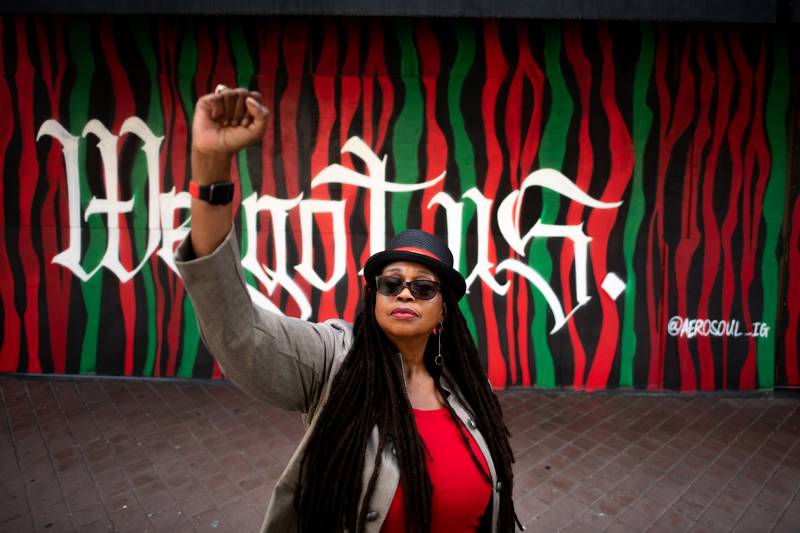P
oets often exaggerate and embellish to make their points. Well, here’s something that may seem hyperbolic but isn’t: Oakland is currently undergoing some of its most significant changes in recent years, by and for the people.
Whether it’s a group of mothers resisting displacement or artists turning the empty fifth floor of the Tribune Tower into an art installation, you only need to look around to appreciate the work happening here. Muralists, journalists, educators, rappers, community organizations, activists and everyday Oaklanders are united on the front lines of change, and making visible progress.
Now, thanks to their collective efforts, we can finally add a Poet Laureate of Oakland to that list. For the first time in the Town’s 169-year history, the city has announced an official literary arts representative—a designated wordsmith who will not only capture Oakland on the page, but share it throughout the world’s literary circuit. The champion selected for this tremendous task?
You might’ve heard of Dr. Nzinga before. She’s a longtime West Oakland resident who founded and directs the Lower Bottom Playaz, a local theater company that centers Black stories, established in 1999. In addition to being a respected community playwright and poet, she’s also an educator and activist who was most recently involved in the city’s massive Refund movement, the campaign to reallocate resources from the police budget to community programs.
“I hate politics. It’s the art of compromise,” Nzinga tells me. “But some things cannot be compromised, and if there’s any hope for politics, it’s local. I couldn’t just be an artist anymore.”
In addition to her creative efforts, she has attended countless meetings and hearings with local officials, delivering messages on behalf of her people. The collective efforts of Nzinga, Cat Brooks, the Anti Police-Terror Project, the Oakland Progressive Alliance and many others helped ensure a victory for the Refund movement. In June, Oakland City Council voted to redirect $18 million away from the mayor’s proposed police budget into alternative methods for community crime prevention.
As Nzinga’s collaborator, Brooks, wrote in her piece “Oakland can ‘Defund the Police’ and ‘Refund the Community,’” “‘all violence is state violence’ [and] it is the state that creates the conditions under which tragic realities play out.” If that’s true, then it must mean that our poets and artists are fostering the conditions in which the possibilities for healing can occur.
And healing is what Nzinga knows best; it’s her chosen form of poetry.
“I have lived in every segment of Oakland,” she tells me during our phone conversation. “I appreciate the slightly different flavors, and I am interested in every little nuance.”
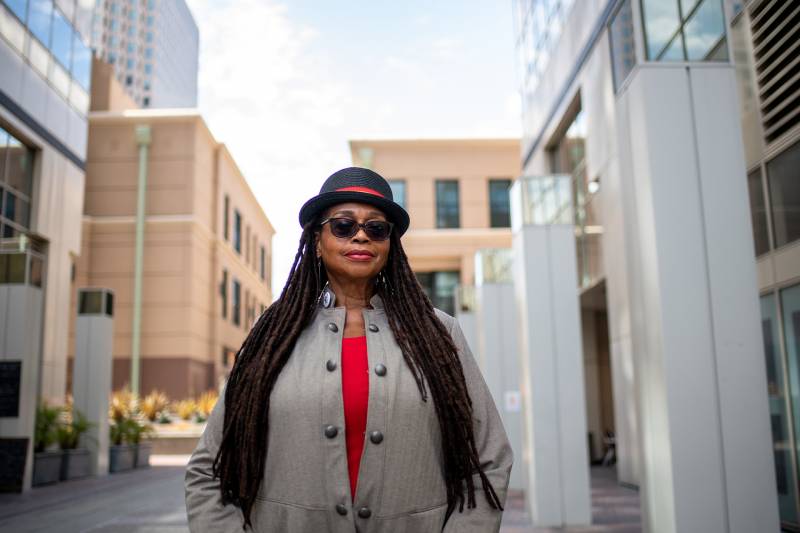
A
s she gets accustomed to her new role, Nzinga is indulging in her desires to build bridges across Oakland’s mosaic of neighborhoods. What poets has she yet to meet in Little Saigon? What writers in Fruitvale will she meet and kick it with? There is a Hmong community in East Oakland, and she wants to be among them. She will be everywhere “where people want to see a laureate.”
Nzinga has a peaceful aura. But don’t get it twisted: she’s a warrior who is strongly rooted in herself, in her beliefs, in her people. She has demands for city officials and challenges for her audiences, too.
“If you want this, you also have to listen to the truth,” she says. “The truth can be beautiful. Maybe I won’t get invited back to some of these places after they hear me, and that’s okay.”
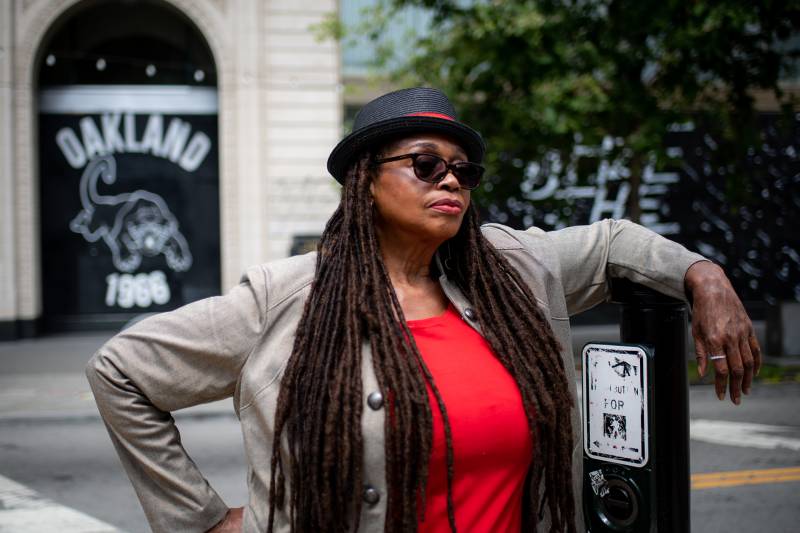
N
zinga holds an MFA in Writing and Consciousness from the New College of California and a Ph.D. in Transformative Education & Change from the California Institute of Integral Studies in San Francisco. She’s fiercely perceptive and resolute, yet tender-eared, as the most generous of poets must be. An afternoon talking to her simultaneously feels like reconnecting with a favorite family member and attending a profound seminar. She is both a communal elder and a judicious scholar; a loving aunt who slips you $5 on a hot day then, later on, asks you to join her as she leads a group of folks on the frontlines of a protest.
She writes poetry on paper, of course, but it’s her actions that express her highest form of poetic engagement with her surroundings. She breaks lines in our society’s flawed barriers and clarifies ancient truths many of us know to exist but cannot articulate with the same level of candor, intuition and clarity. And she doesn’t merely bury this knowledge inside her books, either.
“If I want to continue to make art in Oakland, I have to do more than make art,” Nzinga says. “Can you have anything you’re not really willing to roll up your sleeves and work for?”
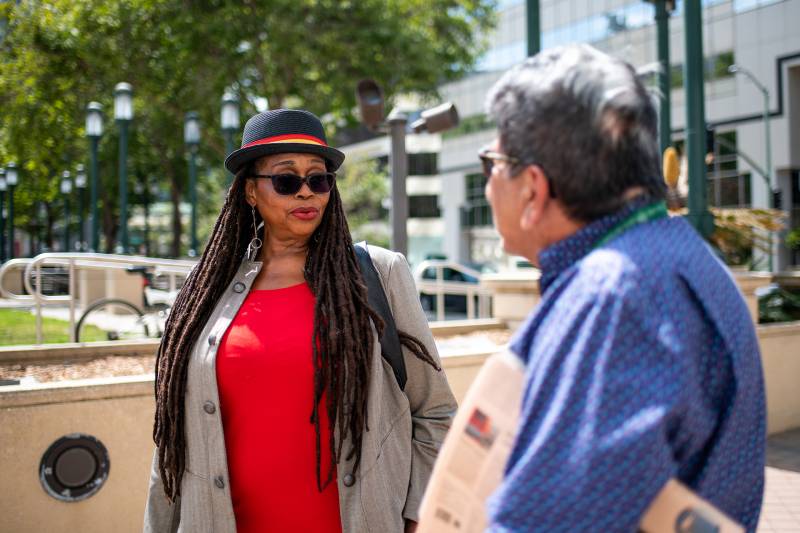
Over the years, she has worked her way into local political spaces, not for ego’s sake, but with purpose and intention. In receiving a title like poet laureate, she hopes to galvanize more residents to disrupt systemic iniquity. Or, as she poetically puts it, “to educate [the community] that they are already aware of the intersections of inequalities and point them to soft spots in places we can leverage.”
During our conversation, she speaks of her admiration for Amiri Baraka, the transcendent writer from the Black Arts Movement who became laureate of Newark, New Jersey in 2002. Bakara created a roadmap for how Nzinga envisions her new role, and she speaks of subverting the “top-down model” by favoring a “bottom-up” approach—in both the political and literary sense.
Inviting children to share a microphone in North Oakland. Hosting celebrations at San Antonio Park in East Oakland. Leading a workshop at a home in West Oakland. Going to a country club and requiring “those in upper places” to pay a fee to listen to poets from the flatlands. These are the sorts of things we can expect from this laureate.
“There are no boundaries,” she says, with excitement in her tone. “How many places can we illuminate by literature? How many people can we give permission to tell their stories and provide an audience to listen?”
Nzinga’s term as the Oakland laureate will last two years. The position comes with a $5,000 stipend and additional funding to organize events through the Oakland Public Library. And though Oakland has appointed a youth poet laureate for the past decade (spotlighting young writers such as Leila Mottley, Greer Nakadegawa-Lee, former KQED Arts intern Samuel Getachew and, most recently, Myra Estrada) the induction of an adult position is nothing short of monumental.
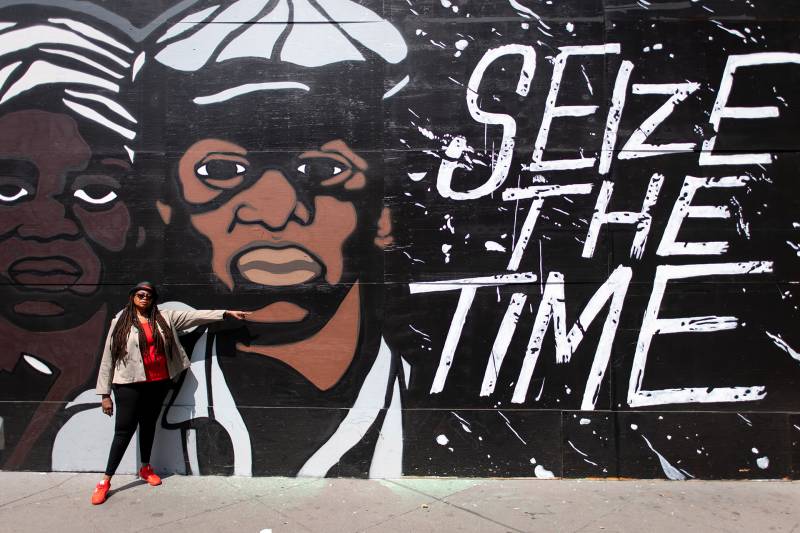
N
zinga and Cultural Affairs Commissioners Roberto Bedoya and J.K. Fowler, who have long been involved in helping make this position a reality, have plans to expand the laureate’s reach beyond Oakland’s limits. They have already hinted at collaborations across the Bay Bridge and throughout the East Bay, with other poets and laureates in neighboring cities, an act of intentional solidarity that isn’t as common as you might think.
“How can a poet emblematize community engagement across Oakland, and beyond? Who could best represent the seven districts?” Fowler, the founding executive director of Oakland’s Nomadic Press, says.
He, Bedoya and others on the commission have spearheaded the launch of Oakland’s inaugural laureateship as a way to deepen the public’s engagement with the literary arts, and to use the literary arts as a form of civic engagement.
“It seemed silly that Oakland, of all cities, didn’t have this position available,” Fowler says. “We wanted to be sure to bring someone in who was honestly and truly engaged across communities. Who is the people’s poet?”
Nzinga might be the first to fill that role, but Oakland’s tradition of activism and poetry runs deep. With luminaries like Ishmael Reed and Chinaka Hodge, poetry and activism go hand-in-hand in this city and region. (San Francisco has been going hard with official laureates since 1998.) But Oakland hasn’t officially recognized poetry’s impact in a formalized, financially-supported and keys-to-all-the-libraries kind of way. Not until this year. And that is progress that can lead to future opportunities for more voices to be heard across more platforms. Seeing that finally happen “is dope,” Nzinga says.
Still, she is aware of her position as the first-ever laureate, and doesn’t plan to just read from behind a dusty podium or hoard clout for herself.
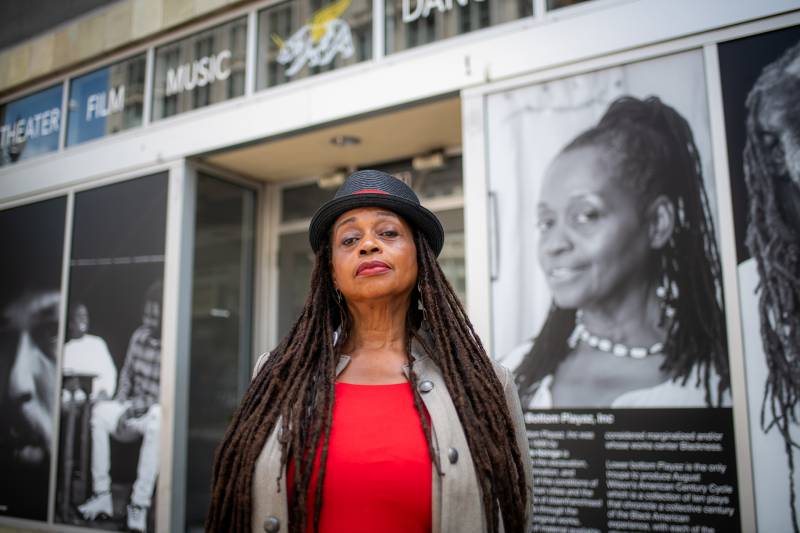
“My job is to keep that door open, not to let it close,” Nzinga declares. “I got my feet and shoulders in the door, and if I’m successful, there won’t be a door when I’m done. We need to collect all the Black and Brown poets throughout Oakland, and the East Bay, and raise hell.”
To some, this might seem like a confrontational or aggressive approach. And maybe it is; maybe it has to be, when positions like this have been historically denied to these communities for centuries. But above that, it’s a statement born from undiluted love—a love for her people, a love for her craft, a love for leading the way into what she calls a more “humanist” future.
“Being a laureate puts me in conversation with more people,” she says. “The message doesn’t change. There is a steadfastness in what I do. I’m just trying to see liberty and good, strong living for humans, for Black people.”
Poetry may get a bad reputation for being overly complex and inaccessible, but for Nzinga, its purpose is simple: to unite us. Join her in conversation as she reads poems and organizes events throughout the next 24 months. To be sure, Nzinga’s legacy won’t be a fleeting stanza, but an epic.
Ayodele Nzinga is the author of The Horse Eaters (2017), Sorrowland Oracle (2020), and the forthcoming Incandescent: Poems of Power (2021).
